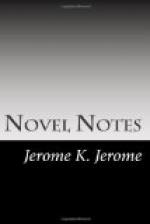“The book did not make the stir that I had anticipated. Some two or three hundred copies went off, and then the sale practically ceased.
“I confess that at first I was disappointed. But after a while, I reflected that, if people would not take my advice, it was more their loss than mine, and I dismissed the matter from my mind.
“One morning, about a twelvemonth afterwards, I was sitting in my study, when the servant entered to say that there was a man downstairs who wanted very much to see me.
“I gave instructions that he should be sent up, and up accordingly he came.
“He was a common man, but he had an open, intelligent countenance, and his manner was most respectful. I motioned him to be seated. He selected a chair, and sat down on the extreme edge of it.
“‘I hope you’ll pard’n this intrusion, sir,’ he began, speaking deliberately, and twirling his hat the while; ’but I’ve come more’n two hundred miles to see you, sir.’
“I expressed myself as pleased, and he continued: ’They tell me, sir, as you’re the gentleman as wrote that little book, How to be Happy, Wealthy, and Wise.”
He enumerated the three items slowly, dwelling lovingly on each. I admitted the fact.
“‘Ah, that’s a wonderful book, sir,’ he went on. ’I ain’t one of them as has got brains of their own—not to speak of—but I know enough to know them as has; and when I read that little book, I says to myself, Josiah Hackett (that’s my name, sir), when you’re in doubt don’t you get addling that thick head o’ yours, as will only tell you all wrong; you go to the gentleman as wrote that little book and ask him for his advice. He is a kind-hearted gentleman, as any one can tell, and he’ll give it you; and when you’ve got it, you go straight ahead, full steam, and don’t you stop for nothing, ’cause he’ll know what’s best for you, same as he knows what’s best for everybody. That’s what I says, sir; and that’s what I’m here for.’
“He paused, and wiped his brow with a green cotton handkerchief. I prayed him to proceed.
“It appeared that the worthy fellow wanted to marry, but could not make up his mind whom he wanted to marry. He had his eye—so he expressed it—upon two young women, and they, he had reason to believe, regarded him in return with more than usual favour. His difficulty was to decide which of the two—both of them excellent and deserving young persons—would make him the best wife. The one, Juliana, the only daughter of a retired sea-captain, he described as a winsome lassie. The other, Hannah, was an older and altogether more womanly girl. She was the eldest of a large family. Her father, he said, was a God-fearing man, and was doing well in the timber trade. He asked me which of them I should advise him to marry.




